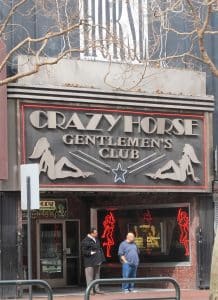Podcast: Play in new window | Download
Listen on: Apple Podcasts | RSS | More
Better known for juicy tales of mobsters, adult film stars, and general shenanigans, the now-closed Las Vegas strip club “Crazy Horse Too” plays a role in providing important lessons in trademark law. The Ninth Circuit Court of Appeals recently put to rest a dispute over the “Crazy Horse” trademark for strip clubs in the United States. The case involved one registration, three refusals, a cancellation proceeding, two contracts, and one lawsuit, collectively illustrating important lessons for trademark owners.

From the Champs Elysees to the Vegas Strip
People have used “Crazy Horse” for strip club names in multiple locations across the United States after the original venue famously opened on the Avenue des Champs Elysees in Paris in the 1960s. Yet, somewhat surprisingly, it was not until 2006 that a North Carolina operator registered the trademark in the United States. When club owners in Nevada and Ohio also tried to register the mark, they were denied.
A cancellation proceeding ensued and was settled with a co-existence agreement between the Las Vegas, Nevada club operator and the North Carolina mark holder, leaving the trademark intact. Later, the North Carolina owner of the mark assigned the mark to the Ohio applicant, who set about licensing the brand throughout the United States. However, the Las Vegas club owner refused to pay license fees and the dispute ended up in court pitting the co-existence agreement against the trademark assignment. The district court held that the co-existence agreement was valid against the assigned trademark and that the Las Vegas owner did not owe any licensing fees. The Ninth Circuit affirmed.
Join Kandis Koustenis and Jennifer Atkins as they discuss the interesting but complex history of the case and the important lessons that can be learned for trademark holders about licensing and co-existence agreements.
Photo credit: THX0477
